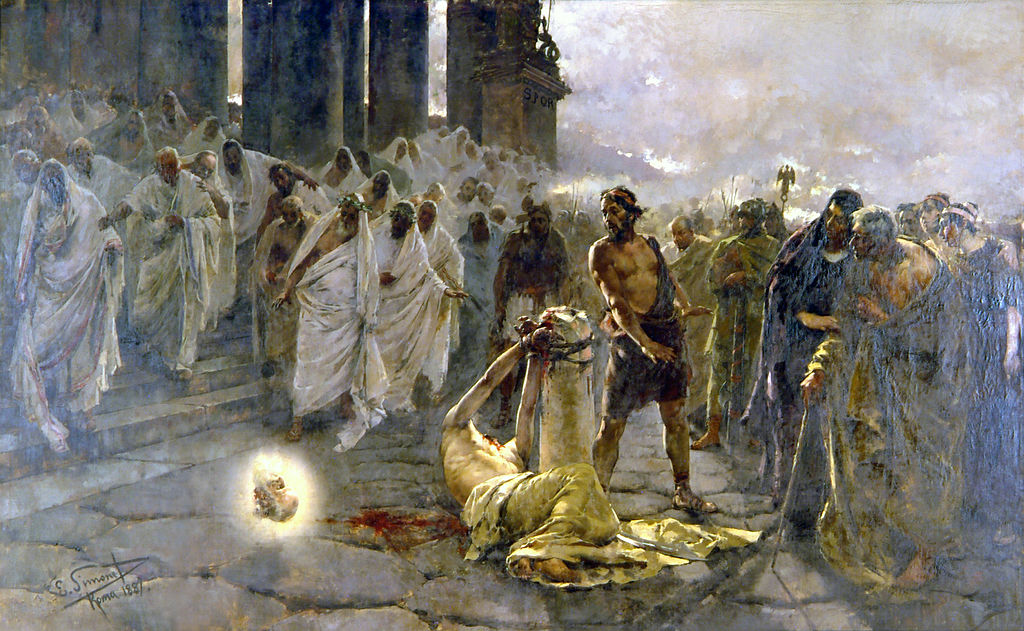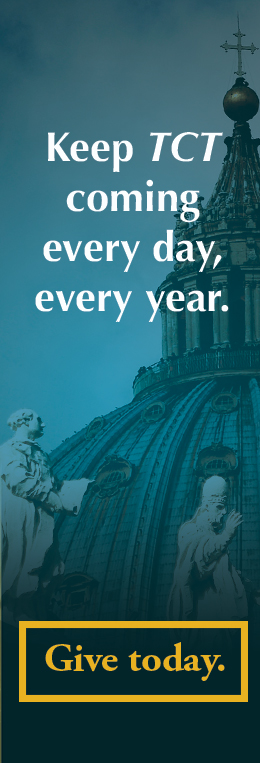We all remember the ancient Roman Cato the Elder and how he was in the habit of concluding every speech he made in the Roman Senate, regardless of the subject matter, with the words, “Carthage, it seems to me, must be destroyed.”
Well, it seems to me that every Catholic priest in America should end every homily he gives, regardless of the subject matter, with the words, “Our Catholic religion regards homosexual behavior as a great sin, and has always regarded it as a great sin since the time of the Apostles.” (You might even say, “Since the Jews gave us the law of Moses.”)
Why do I make this suggestion? Because in the United States, Catholics are on the verge of forgetting this ancient moral truth. Increasingly, the average Catholic feels that homosexual conduct is at worst a minor sin or perhaps no sin at all.
Consider some of the evidence.
1. Although nobody is quite sure how widespread homosexual practice is among our clergy, almost everybody agrees that it is far more common than it is among the general population.
2. Rare is the priestly sermon denouncing homosexual practice. I myself, an old man, have heard homosexuality mentioned only once in a sermon; and in that case, not to remind the congregation of the Catholic teaching, but to remind us to treat gays and lesbians with respect (okay, so far as that goes).
3. The likelihood is great that a priest who gives a sermon of denunciation would annoy, or even infuriate, some parishioners. A few years ago, I remember, at a Catholic school not many miles from where I live, a priest got in trouble with parents for telling students that homosexual practice is a great sin.
4. There is a widespread feeling among Catholics that the expression of disapproval of homosexual behavior is un-charitable, hence un-Christian; for such expressions cause pain to gays and lesbians and their atheistic fellow travelers.
5. Among students attending Catholic colleges (many of these colleges today no more than nominally Catholic), it is not easy to find a student who disapproves of homosexuality and same-sex marriage.
6. Though Church leaders have been willing to acknowledge that priests and even some bishops have been guilty of sexually molesting minors, they have generally been reluctant to acknowledge that homosexuality has been at the root of about 80 percent of that abuse.
7. Church leaders, while pledging to put a stop to clerical sexual abuse, not just of minors but of “vulnerable” adults (this latter category including adult men well into their twenties), have not pledged to purge the priesthood of its homosexual members. Who can be surprised if many Catholics have come to feel that the official attitude is: We don’t mind if a priest is homosexual provided he doesn’t “abuse” anybody, especially kids.

8. The pro-LGBT book written by the well-known Jesuit, Fr. James Martin, Building a Bridge: How the Catholic Church and the LGBT Community Can Enter into a Relationship of Respect, Compassion, and Sensitivity, has been a best-seller among liberal Catholics.
9. Martin’s book has received favorable reviews from such Church luminaries as Cardinal Kevin Farrell (a high-ranking Vatican official), Cardinal Joseph Tobin (archbishop of Newark), Bishop Robert McElroy (of San Diego), and Archbishop Wilton Gregory (of Washington D.C.).
10. There is the appalling history of former Cardinal Theodore McCarrick, who was allowed to rise to the College of Cardinals despite many high-placed clerics, including bishops, knowing of his homosexual proclivities.
The Catholic Church in the United States, I contend, is on the verge of forgetting that homosexual sodomy is an atrocious sin. That’s how St. Paul (remember him?) evaluated it in the first chapter of his Letter to the Romans. And that’s how the Catholic religion has evaluated it for the subsequent twenty centuries.
But today’s conventional moral wisdom – a secularist wisdom, be it noted, indeed an atheistic wisdom – tells us that Paul was homophobic, and tells us too that the Catholic religion he did so much to shape has always been a homophobic religion. In other words, if Catholicism strongly disapproves of homosexuality, it is not because God has revealed his strong disapproval of homosexuality (e.g., in Mosaic law); it is because we Catholics are haters.
And therefore (we are told by the fashionable moral arbiters of our day), our religion contradicts itself; for while proclaiming that love is the greatest of all virtues, Catholicism encourages the practice of hate against LGBTQ persons.
It is not surprising that most American Catholics are more American than they are Catholic. That was not terribly alarming when America was a predominantly Protestant country. But that is no longer the case. America’s opinion leaders, including those who are opinion leaders on questions of morality, are now persons who are atheist or near-atheist in their beliefs and values. Today, unlike in the days prior to the 1960s, the decade in which Protestant cultural hegemony in America went into decline, if you’re a Catholic who is more American than Catholic, you are strongly tinged with atheism.
What do I mean by persons who are “near-atheist”? I mean persons who feel a kind of gravitational pull toward atheism. They find modern-day atheism (which ordinarily sails under the flag of “secular humanism” or “progressivism”) attractive, but they are not quite willing to go all the way, at least not yet.
These near-atheists fall into three categories: (1) agnostics, who are virtual atheists; (2) liberal Protestants, who are virtual agnostics; and (3) liberal Catholics, who are virtual liberal Protestants.
American Catholicism has been significantly tainted with this atheism and near-atheism, and nowhere is this taint more obvious that in the very widespread Catholic reluctance to denounce homosexuality the way St. Paul was in the habit of denouncing it – a reluctance found among both laity and clergy, even among bishops.
Are we modern Catholics wiser than Paul? Do we understand the nature of Christian morality better than he did? Are we afraid to say what Paul said?
*Image: The Beheading of St. Paul by Enrique Simonet, 1887 [Cathedral of the Incarnation, Málaga, Spain]

















